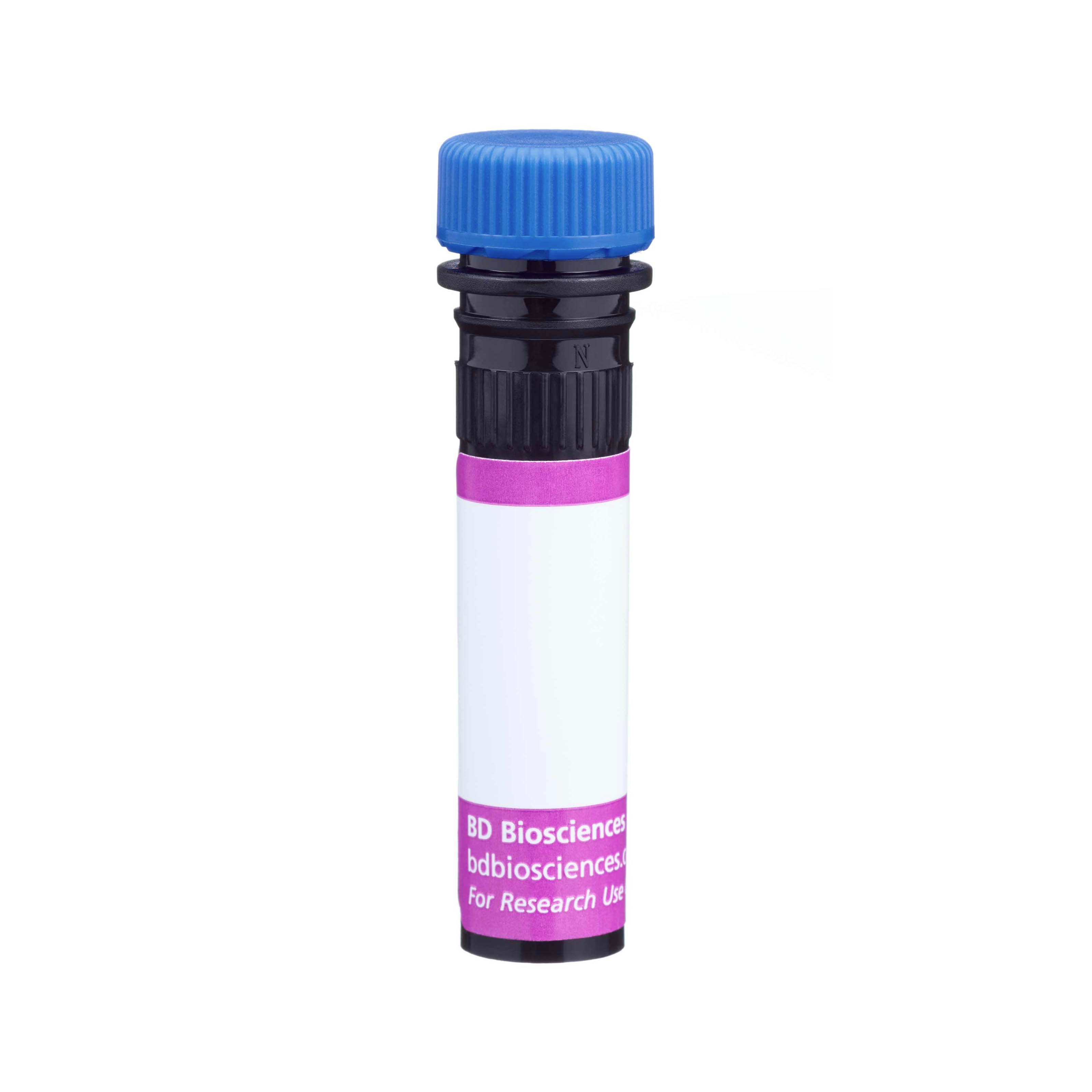Old Browser
This page has been recently translated and is available in French now.
Looks like you're visiting us from {countryName}.
Would you like to stay on the current country site or be switched to your country?




Multiparameter flow cytometric analysis using BD OptiBuild™ BV421 Mouse Anti-Rat Integrin αE2 (CD103) antibody (Cat. No. 744817) on enriched rat monocytes cultured overnight with recombinant rat GM-CSF. Flow cytometry was performed using a BD LSRFortessa™ Flow Cytometer System.


BD OptiBuild™ BV421 Mouse Anti-Rat Integrin αE2 (CD103)

Regulatory Status Legend
Any use of products other than the permitted use without the express written authorization of Becton, Dickinson and Company is strictly prohibited.
Preparation And Storage
Recommended Assay Procedures
For optimal and reproducible results, BD Horizon Brilliant Stain Buffer should be used anytime two or more BD Horizon Brilliant dyes (including BD OptiBuild Brilliant reagents) are used in the same experiment. Fluorescent dye interactions may cause staining artifacts which may affect data interpretation. The BD Horizon Brilliant Stain Buffer was designed to minimize these interactions. More information can be found in the Technical Data Sheet of the BD Horizon Brilliant Stain Buffer (Cat. No. 563794).
Product Notices
- This antibody was developed for use in flow cytometry.
- The production process underwent stringent testing and validation to assure that it generates a high-quality conjugate with consistent performance and specific binding activity. However, verification testing has not been performed on all conjugate lots.
- Researchers should determine the optimal concentration of this reagent for their individual applications.
- An isotype control should be used at the same concentration as the antibody of interest.
- Caution: Sodium azide yields highly toxic hydrazoic acid under acidic conditions. Dilute azide compounds in running water before discarding to avoid accumulation of potentially explosive deposits in plumbing.
- For fluorochrome spectra and suitable instrument settings, please refer to our Multicolor Flow Cytometry web page at www.bdbiosciences.com/colors.
- Please refer to www.bdbiosciences.com/us/s/resources for technical protocols.
- BD Horizon Brilliant Stain Buffer is covered by one or more of the following US patents: 8,110,673; 8,158,444; 8,575,303; 8,354,239.
- BD Horizon Brilliant Violet 421 is covered by one or more of the following US patents: 8,158,444; 8,362,193; 8,575,303; 8,354,239.
- Pacific Blue™ is a trademark of Molecular Probes, Inc., Eugene, OR.
Companion Products






The OX-62 monoclonal antibody recognizes an antigen expressed on dendritic cells, dendritic epidermal T cells (but not RT1B+ Langerhans cells), and intestinal intraepithelial lymphocytes of normal rats and on CD3+ lymphocytes in the spleen and cervical lymph nodes of athymic nude rats. The antigen can be detected by flow cytometric or immunocytochemical analysis of leucocytes and by immunohistochemical staining of epidermal sheets, whole mounts of neural tissue, and frozen sections of lymphoid and nonlymphoid organs. The OX-62 monoclonal antibody immunoprecipitates rat Integrin αE2, a molecule that functions in leucocyte adhesion and homing. Sequence analysis reveals that this molecule is homologous to mouse and human CD103 (Integrin αIEL or αE chain).
The antibody was conjugated to BD Horizon™ BV421 which is part of the BD Horizon Brilliant™ Violet family of dyes. With an Ex Max of 407-nm and Em Max at 421-nm, BD Horizon BV421 can be excited by the violet laser and detected in the standard Pacific Blue™ filter set (eg, 450/50-nm filter). BD Horizon BV421 conjugates are very bright, often exhibiting a 10 fold improvement in brightness compared to Pacific Blue conjugates.

Development References (7)
-
Brenan M, Puklavec M. The MRC OX-62 antigen: a useful marker in the purification of rat veiled cells with the biochemical properties of an integrin. J Exp Med. 1992; 175(6):1457-1465. (Immunogen: Immunofluorescence, Immunohistochemistry, Immunoprecipitation, Western blot). View Reference
-
Brenan M, Rees DJ. Sequence analysis of rat integrin alpha E1 and alpha E2 subunits: tissue expression reveals phenotypic similarities between intraepithelial lymphocytes and dendritic cells in lymph. Eur J Immunol. 1997; 27(11):3070-3079. (Clone-specific: Immunofluorescence, Immunohistochemistry, Western blot). View Reference
-
Chen-Woan M, Delaney CP, Fournier V, et al. In vitro characterization of rat bone marrow-derived dendritic cells and their precursors. J Leukoc Biol. 1996; 59(2):196-207. (Clone-specific: Immunocytochemistry (cytospins)). View Reference
-
Gieseler R, Hoffmann PR, Kuhn R, et al. Enrichment and characterization of dendritic cells from rat renal mesangium. Scand J Immunol. 1997; 46(6):587-596. (Clone-specific: Immunohistochemistry). View Reference
-
McMenamin PG. Distribution and phenotype of dendritic cells and resident tissue macrophages in the dura mater, leptomeninges, and choroid plexus of the rat brain as demonstrated in wholemount preparations. J Comp Neurol. 1999; 405(4):553-562. (Clone-specific: Immunofluorescence, Immunohistochemistry). View Reference
-
Nelson DJ, McMenamin C, McWilliam AS, Brenan M, Holt PG. Development of the airway intraepithelial dendritic cell network in the rat from class II major histocompatibility (Ia)-negative precursors: differential regulation of Ia expression at different levels of the respiratory tract. J Exp Med. 1994; 179(1):203-212. (Clone-specific: Immunohistochemistry). View Reference
-
Penfield JG, Wang Y, Li S, et al. Transplant surgery injury recruits recipient MHC class II-positive leukocytes into the kidney. Kidney Int. 1999; 56(5):1759-1769. (Clone-specific: Immunohistochemistry). View Reference
Please refer to Support Documents for Quality Certificates
Global - Refer to manufacturer's instructions for use and related User Manuals and Technical data sheets before using this products as described
Comparisons, where applicable, are made against older BD Technology, manual methods or are general performance claims. Comparisons are not made against non-BD technologies, unless otherwise noted.
For Research Use Only. Not for use in diagnostic or therapeutic procedures.
Report a Site Issue
This form is intended to help us improve our website experience. For other support, please visit our Contact Us page.